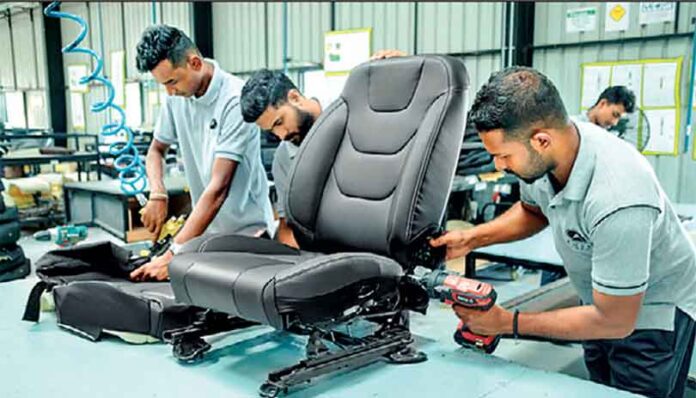Sri Lanka’s local automobile assembly industry is set to expand significantly, with projections to increase exports of vehicles, two-wheelers, and components from the current $800 million to $2 billion within five years.
This growth is expected to create 45,000 direct jobs, according to a senior member of the Local Assemblers’ Association.
Drawing inspiration from nations like Morocco, Thailand, and South Africa, the industry leverages strategic advantages such as location, skilled labor, and government incentives.
Sri Lanka’s Standard Operating Procedure (SOP) under the Ministry of Industries oversees over 17 assembly plants producing motorcars, SUVs, motorcycles, electric three-wheelers, and heavy trucks.
These plants are supported by local manufacturers producing components like tyres, batteries, exhausts, and wiring systems.
The temporary ban on vehicle imports catalyzed the industry’s growth, creating over 10,000 indirect jobs and hiring over 5,000 technically skilled workers, including students and trainees.
However, stakeholders warn that this progress is at risk due to potential unregulated imports of completely built units (CBUs), which could undermine local assemblies and their ecosystems.
Currently, over 20 global automotive brands, including Hyundai, Mahindra & Mahindra, TATA, and Hero, have partnered with local assemblers, contributing to a thriving below-250cc motorcycle market and bolstering Sri Lanka’s industrial reputation.
The component manufacturing sector, which emerged from scratch, now meets international standards and attracts foreign investment, showcasing Sri Lanka’s growing technical capabilities.
The industry emphasizes its economic contributions, from boosting GDP and exports to creating jobs and fostering technological growth.
Assemblers urge the government to ensure a fair and competitive tax policy between locally assembled units and CBU imports when the temporary suspension is lifted, safeguarding the sector’s progress and future potential.
Additionally, this industry has indirectly created more than 10,000 jobs over the past five years, establishing a complete ecosystem that risks being threatened if unregulated imports are allowed. They risk losing all the advancements made over this period.
Although the SOP is a government policy to promote local industry, the new decision to open up completely built unit (CBU) imports will discourage more than 20 local assemblies of international brands operating in Sri Lanka.
Another crucial aspect is the component manufacturing sector, which has grown from nothing to one capable of developing components, scaling down manufacturing processes, and meeting international standards.
“This growth has enabled major brands to set up operations in Sri Lanka, promoting the country’s technical capability on the world stage.”
This has led to significant economic benefits, including job creation, GDP growth, and increased exports. Moreover, a thriving local assembly industry not only contributes to GDP and job creation but also enhances the country’s industrial image, attracts further foreign investments, and fosters technological and economic growth.
